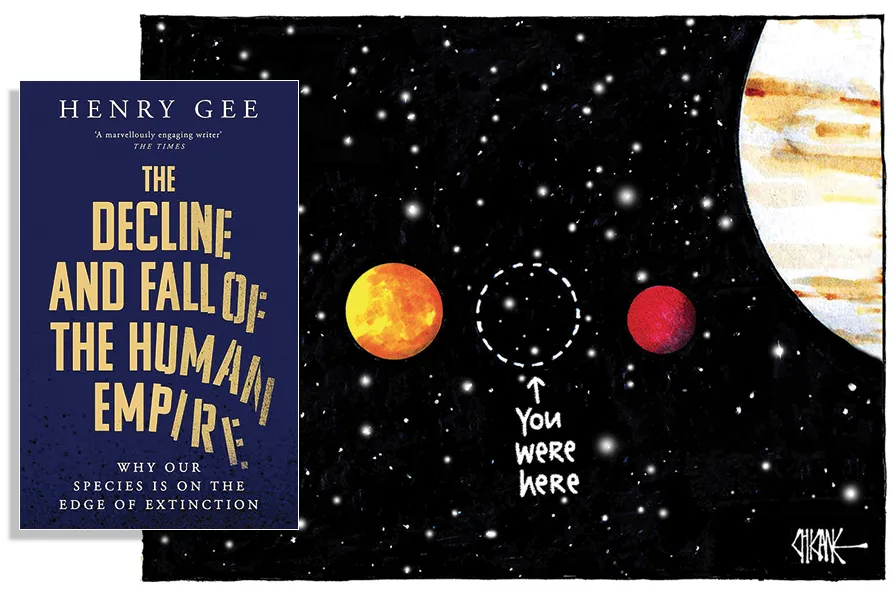DENNIS BROE searches the literary canon to explore why a duplicitous, lying, cheating, conning US businessman is accepted as Scammer-in-Chief
JOHN GREEN wades through a pessimistic prophesy that does not consider the need for radical change in political and social structures

 Cartoon by Citizen Chicane
Cartoon by Citizen Chicane
The Decline and Fall of the Human Empire: Why Our Species is on the Edge of Extinction
Henry Gee, Picador, £18.99
THIS is another “wake-up call” book from the winner of the 2022 Royal Society Science Book Prize but the author himself doubts that we can be successful in averting the demise of our species.
Drawing on an array of the latest scientific research, Gee tells the extraordinary story of humanity with warmth and wit.
He spends the first 70 pages of the book detailing how Homo sapiens emerged on to the world stage, from beginnings as small groups of hunter-gatherers to become the dominant super species. The second part deals with the probable causes of human demise and only the last few pages of the final chapter, The Escape, does he deal with the question of how humans may be able to delay their inevitable doom.
It is an interesting and informative read but offers no new insights or revelatory proposals. Gee details how factors like rapid climate change and rising sea levels, population growth and our profligate use of raw materials, a stagnating global economy, falling birth rates and an unexplainable decline in the average human sperm count are combining to make our chances for longevity increasingly slim. There could be a way forward, but the launch window is narrowing rapidly.
Even though the “the global population is forecast to begin declining in the second half of this century for the first time in over ten millennia,” he writes, “in 10,000 years’ time our species will likely be extinct.”
While his scientific knowledge may be fine, his political nous is sadly wanting.
When looking at factors that will bring about human extinction, such as food shortages, he cites the example of the Irish potato famine – but fails to mention the fact that the British government continued to export food from Ireland during that famine.
Or in his comment about the Ukraine war affecting global wheat production, because of the occupation “of large areas of Ukraine” by the Russians. Ignoring the fact that they occupy a mere 15 per cent of Russian-speaking eastern Ukraine and not the areas where wheat is grown.
On a more basic level, nowhere in the book does Gee consider necessary radical change in political and social structures or ask the question of what sort of quality of life we desire. Interestingly, though, in his chapter “The Future is Green and Female” he says that the increasing equality and education of women could play a key role in delaying our fate.
In his final chapter, The Escape, he considers how we may be able to delay our demise.
He looks at scientific fixes, like genetic engineering and a better utilisation of photosynthesis, for instance. One thing he suggests is the colonisation other planets but this is a vague notion and probably utopian. If we can’t put our own house in order on this planet and overcome wars and conflict, learning to live co-operatively rather than competitively with capitalist modes of relations, what likelihood is there of us being able to do so elsewhere?
In The Decline and Fall of the Human Empire, Henry Gee shows how we arrived at this crucial moment in history, beginning his story deep in the palaeolithic past and charting our dramatic rise from one species of human among many to the most dominant animal to ever live on Earth.
Not a book I could recommend if you are already feeling somewhat depressed about the state of the world!

JOHN GREEN’s palate is tickled by useful information leavened by amusing and unusual anecdotes, incidental gossip and scare stories

JOHN GREEN asks how can we take decisive action on population levels with a world leader who is a destructive ignoramus

GORDON PARSONS is enthralled by an erudite and entertaining account of where the language we speak came from










